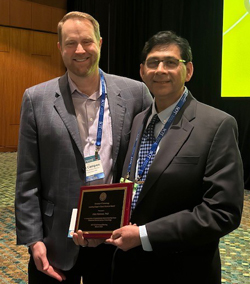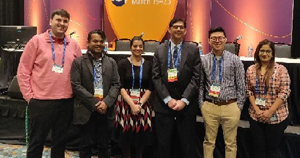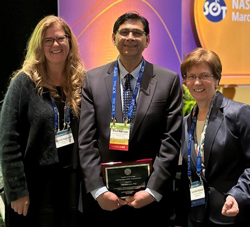News
Lainie Ross Co-Authors Recommendations for Neurodevelopmental Screening for Kids
Wednesday, September 20, 2023
Ross, chair of Health Humanities and Bioethics and director of the Paul M. Schyve, MD, Center for Bioethics, says universal genomic sequencing of newborns for neurodevelopmental disorders would worsen health disparities due to several factors. Writing in Pediatrics, she and her co-authors instead recommend strategic use of NDD screening on populations of children who show signs of developmental delays.
Read More: Lainie Ross Co-Authors Recommendations for Neurodevelopmental Screening for KidsWhat Makes Us Tick: Smoking’s Effect on Our Biological Clock
Thursday, August 10, 2023
Cells in nearly every human tissue and organ contain proteins that govern circadian rhythms. In essence, these molecules together act as a microscopic clock timed to waxing and waning sunlight.
“When sunlight enters your eyes in the morning, it sends a signal to the pineal gland in your brain that sets off a chain reaction of hormone production, waking your body up and affecting your appetite, body temperature, blood pressure, and more,” Rahman explained. “As darkness sets in, your body winds down, preparing for sleep.”
Rahman studies how environmental exposures affect molecular clock proteins in the lungs.
“The molecular clock’s purpose is to prepare your body for expected changes in the environment, like the times for activity, times for sleep, and times to eat,” Rahman said. “However, environmental exposures, including tobacco smoke and vaping, can disrupt the production of clock molecules, leading not only to changes in sleep cycles but also to lung injury or respiratory disease.”
For example, in a study on the effects of trendy e-cigarette and tobacco products on lung health, Rahman and team found that exposure to either waterpipe smoke or e-cigarette vapor altered expression of molecular clock proteins in mouse lungs. Those changes could in turn affect lung function, the authors suggested.
Jet lag, night-shift work, and blue light from electronic devices can also affect the molecular clock. Smoking or vaping can potentially exacerbate the impacts of those factors.
Read More: What Makes Us Tick: Smoking’s Effect on Our Biological ClockDebra Cory-Slechta Explains How Wildfire Smoke and Air Pollution can Harm the Brain
Thursday, August 3, 2023
In an interview with Rick Woychik, director of the National Institute of Environmental Health Sciences, the professor of Environmental Medicine shares how research into how fine air particles impact the brain is transforming our understanding of neurodegenerative and neurodevelopmental disorders. Woychik interviewed Cory-Slechta after seeing her presentation at the first Human Health and the Environment Research Symposium at the Medical Center in June, where he was a guest speaker.
Read More: Debra Cory-Slechta Explains How Wildfire Smoke and Air Pollution can Harm the BrainLainie Friedman Ross Receives Honorary Doctorate of Humanities
Thursday, May 11, 2023
On May 12, 2023, during the commencement ceremony at Oakland University in Rochester, Michigan, Lanie Friedman Ross, MD, PhD, will receive an honorary Doctor of Humanities degree for her exemplary scholarship and leadership in bioethics. Ross recently joined URMC as the inaugural Chair of Health Humanities and Bioethics and serves as director of the Paul M. Schyve, MD Center for Bioethics.
At Oakland University, the William Beaumont School of Medicine is a relatively new institution, established in July 2008. Ross’s nomination comes during the creation of their first Center for Moral Values and Medicine. Three bioethicists at the university recommended her for this honor, stating that she is “arguably the most influential, accomplished, and important pediatric ethicist of our time.”
Ross’s core areas of expertise include ethical and policy issues in pediatrics, clinical decision making, death and organ transplantation, genetics/genomics, clinical research ethics, and human subject protections. She has published five books, over 225 peer-reviewed journal articles and book chapters, and is currently writing a sixth book examining ethical issues related to siblings in health care.
“I’m thrilled to receive this honorary Doctor of Humanities degree,” said Ross. “It is a validation of the importance of bioethics in academic medicine and the training of the next generation of clinicians in both the art and science of medicine.”
EHSC Member Publishes in National Academies
Friday, April 28, 2023
EHSC member Dr Ehsan Hoque and colleagues published a very compelling perspective by the National Academy of Engineering, highlighting connections among computer science, climate change, human health, and cognition. The article titled "The Untapped Potential of Computing and Cognition in Tackling Climate Change".
See below for link to article.
Read More: EHSC Member Publishes in National AcademiesHalting the Rise of Parkinson’s
Monday, April 24, 2023
Quality of life, health, and longevity are being increasingly tied to someone’s zip code rather than their genetic code. Cancer, heart disease, neurodegenerative disorders, and even our ability to fight infection are linked to the myriad of chemicals we are exposed to, often unwittingly, over the course of our lives. The University of Rochester’s leadership in the field of environmental medicine stretches back to toxicology research programs developed at the University under the Manhattan Project. These programs also served as the basis for the formation of a NIEHS Center of Excellence in environmental toxicology and health that is one of the oldest in the country celebrating 50 years of sustained funding. This foundation and the decades of work that followed—coupled with the recognition that the public health threat requires a collaborative commitment to research, education, and community engagement—led to the creation of the new Institute for Human Health and the Environment.
Paige Lawrence, PhD, the Wright Family Research Professor and chair of the Department of Environmental Medicine, is the founding director of the new Institute. “Genetics only explaining 10 to 15 percent of human health, which leaves the rest to the environment,” said Lawrence. “If we really want to have an impact on health, environmental influences need to be front and center.”
The new Institute will help power a team of neurologists, neuroscientists, toxicologists, epidemiologists, and researchers at the University of Rochester who are examining the impact of environmental chemical exposure on the brain. One disease in particular stands out. Parkinson’s is the fastest growing neurodegenerative disease in the world, outpacing even Alzheimer’s, and a growing number of scientists are linking the disease’s rise to air pollution, pesticides, and a ubiquitous chemical pollutant.
Up the nose it goes
Air pollution is associated with many health problems, including asthma, heart disease, stroke, low birth weight, and inflammation. While epidemiological studies have hinted at the link between air pollution and neurological disorders like Parkinson’s and Alzheimer’s, the route these chemicals use to make their way into the brain, and the damage caused once there, was until recently poorly understood.
“We’ve known that air pollution has effects on the heart and the lung for a very long time, but it's really only been in about the past ten years that attention has been directed to its effects on the brain,” said Debbie Cory-Slechta, PhD, a professor of Environmental Medicine, Neuroscience, and Public Health Sciences. Cory-Slechta’s colleagues at the University of Rochester, Guenter Oberdoerster, PhD, and Alison Elder, PhD, were among the first to show that ultra-fine air pollution particles, called PM0.1, are able to hitch a ride directly into the brain via the nasal passage and olfactory nerves, bypassing the brain’s normal defenses.
Read More: Halting the Rise of Parkinson’sThe 2023 SOT Leading Edge in Basic Science Award Recognizes Irfan Rahman for His Contributions to Pulmonary Toxicology and Specifically How E-Cig and Cigarette Smoke Causes Lung Injury and Disease
Thursday, April 6, 2023
 This award recognizes a scientist who, based on research, has made a recent (within the last five years), seminal scientific contribution/advance to understanding fundamental mechanisms of toxicity. The recipient should be a respected basic scientist whose research findings are likely to have a pervasive impact on the field of toxicology.
This award recognizes a scientist who, based on research, has made a recent (within the last five years), seminal scientific contribution/advance to understanding fundamental mechanisms of toxicity. The recipient should be a respected basic scientist whose research findings are likely to have a pervasive impact on the field of toxicology.
 Irfan Rahman, PhD, has received the 2023 Society of Toxicology (SOT) Leading Edge in Basic Science Award for his contributions and advances in pulmonary toxicological sciences, specifically for his unwavering commitment to investigating how electronic cigarettes and cigarette smoke cause lung injuries and disease in humans, focusing on the fundamental alterations of DNA damage and cellular senescence. As part of this award, Dr. Rahman will deliver the Leading Edge in Basic Science Award Lecture on Tuesday, March 21, 12:30 pm–1:30 pm during the 2023 SOT Annual Meeting and Tox Expo.
Irfan Rahman, PhD, has received the 2023 Society of Toxicology (SOT) Leading Edge in Basic Science Award for his contributions and advances in pulmonary toxicological sciences, specifically for his unwavering commitment to investigating how electronic cigarettes and cigarette smoke cause lung injuries and disease in humans, focusing on the fundamental alterations of DNA damage and cellular senescence. As part of this award, Dr. Rahman will deliver the Leading Edge in Basic Science Award Lecture on Tuesday, March 21, 12:30 pm–1:30 pm during the 2023 SOT Annual Meeting and Tox Expo.
 Dr. Rahman holds a PhD in biochemistry on neutrophil functions in hypertension. He completed a postdoctoral fellowship on lung toxicology at the University of Miami and Georgetown University before relocating to the University of Edinburgh, where he focused on environmental agents and lung inflammation and received an appointment as a Senior Research Scientist/Lecturer. In 2003, Dr. Rahman joined the faculty of the University of Rochester Medical Center Department of Environmental Medicine where he has risen through the faculty ranks with appointments with the Department of Public Health Sciences, Division of Pulmonary and Critical Care Medicine, and Eastman Institute for Oral Health. Since 2018, he has been the Director of the Center for Inhalation and Flavoring Toxicological Research.
Dr. Rahman holds a PhD in biochemistry on neutrophil functions in hypertension. He completed a postdoctoral fellowship on lung toxicology at the University of Miami and Georgetown University before relocating to the University of Edinburgh, where he focused on environmental agents and lung inflammation and received an appointment as a Senior Research Scientist/Lecturer. In 2003, Dr. Rahman joined the faculty of the University of Rochester Medical Center Department of Environmental Medicine where he has risen through the faculty ranks with appointments with the Department of Public Health Sciences, Division of Pulmonary and Critical Care Medicine, and Eastman Institute for Oral Health. Since 2018, he has been the Director of the Center for Inhalation and Flavoring Toxicological Research.
The research program that Dr. Rahman has developed unites the fields of circadian biology, chromatin remodeling, inflammation, sirtuin1 deacetylase (SIRT1) dynamics, and oxidants related to the impact of tobacco products on lung toxicology. He has been a longstanding pioneer with seminal contributions and cutting-edge research on mitophagy, steroid resistance, and lung cellular senescence and is a leader in the role of oxidative stress and redox signaling in gene transcription in tobacco-related pulmonary diseases. In addition, he also has been a leader in the molecular biology of chromatin remodeling and cellular senescence in the lung in response to oxidative stress and cigarette smoke and was the first to show chromatin remodeling and cellular senescence in the lung in response to cigarette smoke. He has identified several exciting potential therapies that could prevent tobacco-related lung complications from progressing.
 Dr. Rahman’s mechanistic discoveries and experience translated rapidly to address major issues for human health in the past five years, namely COVID-19 and e-cigarette toxicity. Of critical importance, he is constantly evolving his research to meet the challenging landscape of tobacco/e-cigarette products for lung health. For example, with regard to the rapid emergence of e-cigarettes in the high school population and the hookah waterpipe tobacco bars in college communities, Dr. Rahman already has published several papers on these products. During the pandemic, Dr. Rahman worked on COVID-19 biospecimens and showed that smokers/vapers are more susceptible to infection and are more likely to develop strong lung inflammatory response via upregulation of ACE2 via nicotine receptor alpha 7, particularly in older individuals.
Dr. Rahman’s mechanistic discoveries and experience translated rapidly to address major issues for human health in the past five years, namely COVID-19 and e-cigarette toxicity. Of critical importance, he is constantly evolving his research to meet the challenging landscape of tobacco/e-cigarette products for lung health. For example, with regard to the rapid emergence of e-cigarettes in the high school population and the hookah waterpipe tobacco bars in college communities, Dr. Rahman already has published several papers on these products. During the pandemic, Dr. Rahman worked on COVID-19 biospecimens and showed that smokers/vapers are more susceptible to infection and are more likely to develop strong lung inflammatory response via upregulation of ACE2 via nicotine receptor alpha 7, particularly in older individuals.
Dr. Rahman’s publications list consists of 225 original papers, 90 reviews, and 25 book chapters with an h-index of 110 with more than 50,000 citations; he also was selected for a list of Highly Cited Researchers by Thomson Reuters in 2014, 2015, and 2016. He has been recognized internationally and is ranked 16 of 52,718 active respiratory and allergy researchers by Ioannidis et al. (2020) He is the editor and author of Inflammation, Aging, Diet, and Nutrition, a book published by Elsevier in 2013. During his career, he has held 21 Associate Editor and Editorial Board memberships and has reviewed articles for more than 50 journals. In addition, he is the Principal Investigator on four National Institutes of Health grants.
 Dr. Rahman has devoted his career to teaching, understanding, and the prevention/treatment of smoking-related lung diseases. Over the years Dr. Rahman has mentored eight full-time graduate students, 30 postdoctoral scholars, and four undergraduate students, several of whom are now prominent faculty members at various institutions.
Dr. Rahman has devoted his career to teaching, understanding, and the prevention/treatment of smoking-related lung diseases. Over the years Dr. Rahman has mentored eight full-time graduate students, 30 postdoctoral scholars, and four undergraduate students, several of whom are now prominent faculty members at various institutions.
Dr. Rahman has attended the SOT Annual Meeting and ToxExpo regularly since 2003 and has been an SOT member since 2005. He has continuously provided leadership in SOT, serving as a Councilor and President of the SOT Inhalation and Respiratory Specialty Section. He also has been involved in the American Thoracic Society as a Program Committee member for the Respiratory Cell and Molecular Biology (RCMB) Assembly and created the Lung Aging Research Interest Group in the RCMB Assembly. In 2022, he received an American Thoracic Society Recognition Award for Scientific Accomplishments.
#Communique:SOTNews
#Awards
#Members
PFAS: What You Need to Know
Tuesday, March 21, 2023
 PFAS are potentially harmful chemicals that can be found in common, everyday products and most drinking water. They are known as “forever chemicals” because they do not break down over time, and health leaders across the country are concerned about the negative effects of long-term exposure.
PFAS are potentially harmful chemicals that can be found in common, everyday products and most drinking water. They are known as “forever chemicals” because they do not break down over time, and health leaders across the country are concerned about the negative effects of long-term exposure.
Researchers at URMC study the impacts PFAS have on our health. Scientists Martha Susiarjo, PhD, associate professor of Environmental Medicine, and Jing (Jason) Wu, PhD, assistant professor of Medicine and Pharmacology/Physiology share what they know about the chemicals and how they impact our lives.
Read More: PFAS: What You Need to KnowUniversity Launches Institute for Human Health and the Environment to Find Solutions to the 21st Century’s Most Pressing Health Issues
Friday, January 13, 2023
The foods we consume. The air we breathe. The stress we experience. The chemicals we are exposed to (willingly and unwillingly). The changing climate. Everything in and around us influences our health. Amazingly, quality of life and longevity are more closely tied to where someone lives than their genetic code.
The University of Rochester believes that finding solutions to the 21st Century’s most pressing health issues – including cancer, heart disease, neurodegenerative disorders, and our ability to fight infection – requires a collaborative commitment to research, education, and community engagement related to how the environment influences health across the lifespan. The new UR Institute for Human Health and the Environment (IHHE) will bring this vision to life.
Led by B. Paige Lawrence, Ph.D., the Institute will serve as a local and national hub to catalyze new scientific discoveries related to environmental impacts on health and transform this information into actions that will promote healthier lives for all.
“The University has been a leader in research and education in environmental health and toxicology since the 1940s, so we’re building off an extremely strong foundation,” said Lawrence, the Wright Family Research Professor and chair of the department of Environmental Medicine. “Many teams are already conducting research, teaching, and working with community members on issues related to the environment and health, but we know we can do more. It is exciting to launch this new institute, and I encourage folks to get involved. We want to hear what people across the University are passionate about and help to make their work more impactful. I encourage anyone who is interested to check out our web site and reach out to us – we want to hear from you!”
“Environmental factors such as geographic location and exposure to toxins have a profound impact on susceptibility to disease,” said Mark B. Taubman, M.D., URMC CEO and dean of the School of Medicine and Dentistry. “Some populations are disproportionately affected by these environmental risks, particularly communities of color. Collectively, we have the experience needed to partner with these communities and to use our knowledge to modify or prevent risk factors and make a difference in their lives.”
The IHHE will integrate programs and expertise from across all UR schools and will be anchored by three interactive pillars: Research; Career Development and Education; and Engagement. Initially, the Institute’s key areas of focus will include climate change and health; environmental justice; how water and air pollution impact health; and how environmental factors shape health across our whole lifetime.
Research
The IHHE will serve as a major hub for innovative and inclusive research that melds academic and scholarly disciplines. By creating new opportunities to gather knowledge and bring together different points of view, and through the sharing of expertise, the IHHE will propel research on many facets of environmental health. Gaining a better understanding of the intrinsic molecular, cellular, and socioeconomic mechanisms that underpin associations between health and the environment will transform care and lead to new ways to improve public health.
Career Development and Education
The Institute will support education and career development across all career stages. It will enhance existing programs, including an undergraduate major in Environmental Health, and multiple graduate programs, including Toxicology, Epidemiology, and Biostatistics & Computational Biology. Understanding how environmental factors influence health is already part of several other programs anchored in Public Health Sciences, Neuroscience, Engineering, and Data Science. The Institute will strengthen and extend connections between these programs and support a more diverse and inclusive environment to recruit and retain highly talented individuals. The Institute will also support programs for K-12 students in the Rochester area.
Engagement
The IHHE builds on a long history of environmental justice and community engagement related to how the lived environment influences the health of individuals and communities. This includes working with local community members to develop, evaluate, and disseminate community-based approaches to solve problems. For example, teams at UR contributed to Rochester’s local lead poisoning prevention system, which has resulted in lead poisoning rates declining 2.4 times faster than elsewhere in NY State, and has served as a national model for community-based action. Activities will be anchored in multidirectional engagement between the University and local and global partners to shape research and to evaluate and inform changes in policies, systems, and communities.
Anyone who is interested in learning more about the Institute and how they can get involved can visit the IHHE web site or reach out to the leadership team:
- Director: B. Paige Lawrence, paige_lawrence@urmc.rochester.edu
- Deputy directors of research: Deborah Cory-Slechta, Deborah_cory-slechta@urmc.rochester.edu; Martha Susiarjo, Martha_susiarjo@urmc.rochester.edu
- Deputy director of education and career development: Edwin van Wijngaarden, Edwin_van_wijngaarden@urmc.rochester.edu
- Deputy director of engagement: Katrina Korfmacher, Katrina_korfmacher@urmc.rochester.edu